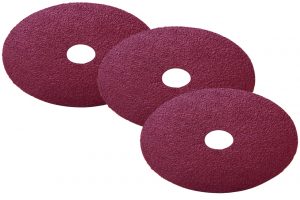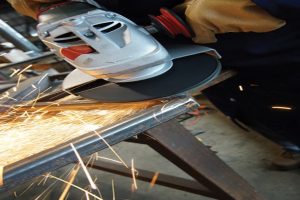Home / News & Blog / Abrasive Blog / Recommended Abrasive Grit Sizes for All Types of Resin Bonded Grinding Wheels
Resin discs are a cornerstone of efficiency and precision in the abrasives industry. Whether for metal fabrication, automotive repair, or construction, these versatile tools are essential for cutting, grinding, and polishing various materials. This guide explores resin discs’ types, applications, and recommended abrasive grain sizes for different tasks.
Resin discs refer to resin-bonded cutting and grinding wheels, typically 0.8mm to 8mm thick with diameters ranging from 100mm to 400mm. Reinforced with fiber fabric, these discs offer high tensile, impact, and bending strength, making them ideal for cutting both metal and non-metal materials.
Among resin abrasives, resin discs have the highest production volume, broadest usage, and most diverse market applications. They are primarily categorized into: cutting discs, grinding discs and special discs.


1. Resin cutting disc
These discs are essential for slicing through various materials. Their sizes typically fall into three categories:
① Small slices: resin-cutting discs with a diameter of less than 4.5 inches. The sizes vary from country to country. When converted into millimeters, they are generally 50mm, 75mm, 100mm, 102mm, 107mm and 115mm, etc. They are commonly used in small handheld cutting machines and angle grinders and are suitable for cutting smaller workpieces or hard-to-reach areas.
② Medium slices: Resin cutting discs with a diameter of mainly 5-7 inches. Common diameters are 125mm, 150mm, 180mm, and 250mm. They are suitable for general metal-cutting tasks and are commonly found in workshops or on-site industries.
③ Large slices: 230mm (9 inches), 300mm (12 inches), 350mm (14 inches), 400mm (16 inches), mostly used for heavy cutting operations, such as steel processing, metal cutting at construction sites, etc.
The abrasive grain size of the cutting disc directly affects its cutting performance and surface quality.
Recommended abrasive grain sizes are:
Coarse abrasive grain size: F16, F24, F30, suitable for fast cutting, high efficiency but rough cutting surface. Commonly used for fast cutting of hard materials such as stainless steel pipes, iron pipes, angle steel, etc.
Medium abrasive grain size: F36, F46, F54, suitable for conventional cutting needs, balance between efficiency and surface quality. Suitable for cutting tasks of various metal and non-metal materials.
Fine abrasive grain size: F60, F80, F100, suitable for fine cutting, can provide a flatter and smoother cutting surface. Mainly used for cutting operations that require high precision and good surface quality, such as thin-walled materials and some precious metals.
2. Resin polishing pads
Resin grinding discs are mainly used for grinding, polishing, and cleaning metal surfaces, and are widely used in various industrial occasions. Depending on the different grinding equipment and needs, the diameter of the resin grinding disc has a variety of specifications, the common ones include:
Small grinding discs: mainly grinding discs with a diameter of less than 4.5 inches, including 75mm (3 inches), 100mm (4 inches), and 115mm (4.5 inches). They are suitable for small handheld angle grinders and are mainly used for small-area finishing and surface treatment.
Medium grinding discs: 125mm (5-inch) and 150mm (6-inch) for a variety of common metalworking tasks including deburring, rust removal, weld grinding, and more.
Large grinding discs: 180mm (7 in) and 230mm (9 in) are commonly used for heavy-duty sanding and are suitable for treating large surfaces.
Resin grinding discs have a wide range of particle sizes to meet different grinding effects and surface treatment requirements.
Common abrasive grain sizes include:
Coarse grain size: F16, F24, F36, suitable for operations that remove large amounts of material, such as removing rust layers, grinding welds, and quickly finishing rough surfaces.
Medium grain size: F40, F60, and F80, used for general grinding tasks, can effectively remove materials while ensuring a certain surface flatness. Commonly used for preliminary grinding and surface smoothing.
Fine grain size: F100, F120, F150, suitable for fine polishing, can provide a relatively smooth surface effect. Commonly used for finishing parts with high surface requirements.
Finer grain size: F180, F240, F320, and finer, these grits are suitable for precision grinding and polishing and can achieve a very smooth surface effect, suitable for finer metal or wood surface treatment.
3. Special thin discs
Specialty discs are tailored for specific industries, such as foundries, shipbuilding, nuclear industries, and railway maintenance. While their dimensions align with standard cutting and grinding discs, manufacturers use unique production processes, customized abrasives, and specialized reinforcement materials to meet industry-specific requirements.
Applications
1. Metalworking Applications
Resin discs are extensively used in metalworking for their ability to cut, grind, and finish a wide range of metal surfaces.
Metal Cutting:
Resin-cutting discs are designed for slicing through various metals, including steel, aluminum, and cast iron.
Common applications include cutting metal sheets, pipes, and structural components in fabrication shops and construction sites.
Weld Seam Removal:
Grinding discs are used to smooth out weld seams, ensuring a clean and polished finish.
Essential in industries like automotive manufacturing, shipbuilding, and heavy machinery production.
Rust and Paint Removal:
Resin discs with coarse grit effectively remove rust, old paint, and coatings from metal surfaces.
Used in restoration projects, metal recycling, and surface preparation before repainting or coating.
Deburring:
After cutting or machining, resin discs are used to remove sharp edges and burrs, ensuring smoothness and safety in the final product.
2. Automotive Applications
The automotive industry relies heavily on resin discs for repairing, refinishing, and maintaining vehicle components.
Bodywork Sanding and Refinishing:
Resin discs are ideal for smoothing car panels, removing imperfections, and preparing surfaces for painting or clear coating.
Silicon carbide discs are commonly used for wet sanding, providing ultra-smooth finishes.
Rust Repair:
Coarse resin discs help remove rust from car bodies, chassis, and undercarriage components before repairs.
Polishing and Buffing:
Fine-grit resin discs are used to polish headlights, trim, and other automotive parts, restoring their shine and appearance.
Brake and Engine Maintenance:
Discs are employed to clean and grind brake rotors and engine components, ensuring optimal performance.
3. Construction and Stone Applications
Resin discs are indispensable in construction and stonework, where cutting and polishing hard materials is a routine task.
Cutting Concrete and Stone:
Resin-cutting discs can easily slice through concrete, bricks, tiles, and natural stone.
Commonly used in construction projects for precise cutting and shaping of structural materials.
Grinding and Leveling:
Grinding discs are used to level uneven concrete surfaces and prepare them for coatings or overlays.
Essential for smoothing rough edges on stone tiles and countertops.
Polishing Decorative Stone:
Resin discs with fine abrasives are used to polish marble, granite, and other decorative stones, enhancing their aesthetic appeal.
Ideal for creating glossy finishes on countertops, floors, and wall panels.
4. Woodworking Applications
Although resin discs are more commonly associated with metal and stone, they are also valuable in woodworking.
Sanding Wooden Surfaces:
Resin discs help sand wooden furniture, cabinetry, and flooring, preparing them for staining or painting.
Coarse-grit discs are used for shaping, while fine-grit discs refine the surface for finishing.
Detailing and Shaping:
Fine resin discs are ideal for intricate work on carvings, moldings, and delicate wooden projects.
Restoration Projects:
Resin discs can strip old finishes, paint, or varnish from wood, making them essential in furniture restoration.
5. Aerospace and Industrial Applications
In high-precision industries like aerospace and heavy manufacturing, resin discs play a crucial role in maintaining quality and safety standards.
Precision Grinding:
Ceramic resin discs are used for grinding hard metals and alloys, including titanium and Inconel, commonly used in aerospace components.
They provide excellent performance with minimal heat generation, ensuring the integrity of the material.
Surface Preparation:
Resin discs are used to prepare surfaces for treatments such as coating, plating, or bonding, ensuring optimal adhesion and durability.
Machinery Maintenance:
In industrial settings, resin discs are used to repair and maintain heavy machinery by grinding and smoothing worn-out parts.
Resin discs are versatile tools essential for cutting, grinding, and polishing across industries. Their efficiency and adaptability make them a go-to choice for tasks in metalworking, construction, automotive, and more, delivering reliable performance and precise results.